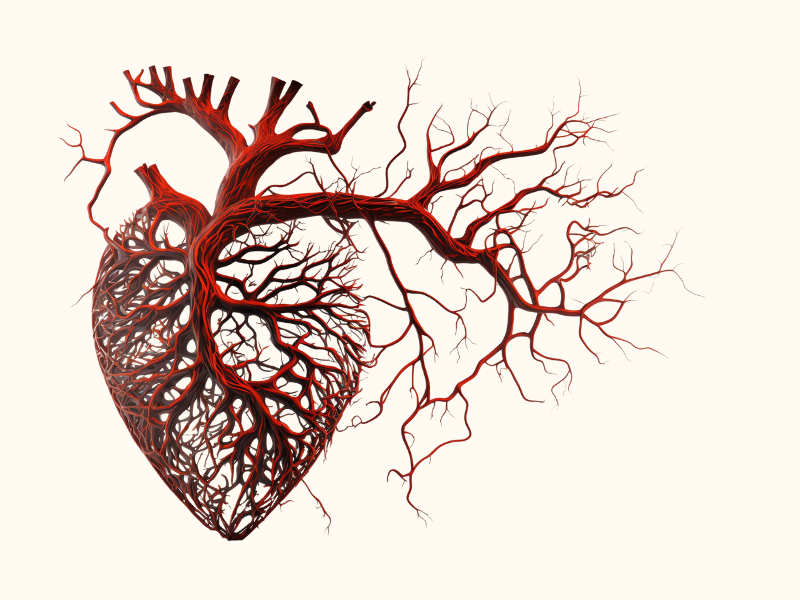26/10/2023
Naturally Improving your Heart Health
The heart is the most important organ in the body, needing the utmost care and attention.
Leaving our heart's health on that back-burner can be detrimental, for the chance that it may lead to heart disease. It pumps oxygen around the body, ultimately, to keep us alive. To put it lightly, the heart needs to be taken care of.
Certain nutrients work wonders for heart health. In this blog post, we walk you through some of the natural ways you can improve heart health, through your nutrition.
High Dose Vitamin K in Heart Health
Scientific study suggests that higher doses of vitamin K2 intake are most likely to prevent the development or progression of cardiovascular disease.
There have been no reports of adverse side effects in clinical studies involving daily K2 doses ranging from 10 mcg to 135 mg. (1) (The vitamin K2 dose of 135 mg is very high by historic standards, yet no toxicity was observed.)
Vitamin K2 helps prevent arterial stiffening, buildup of plaque in artery walls, and endothelial dysfunction. These and other actions reduce the development and progression of atherosclerosis, a major cause of heart disease.
Pomegranete's Benefits
Pomegranate is a nutrient-dense food with compounds that promote heart health. (2-5) Preclinical and clinical studies show that pomegranate can improve blood flow, (7,8) reduce arterial blood clots, (6) and modestly lower cholesterol, triglycerides, and blood pressure.(9)
Most notably, pomegranate has been shown to help prevent and even reverse some of the blood vessel damage that can lead to heart attack and stroke. (2,3,10,11) A clinical study in patients with atherosclerosis found that pomegranate consumption substantially decreased the thickness of carotid artery plaques. (10)
Fresh pomegranate fruit or juice can be high in fructose. (12) For those who want to avoid sugar, pomegranate extracts provide an alternative.
CoQ10 and Congestive Heart Failure
CoQ10 can protect aging heart muscle. A recent study indicates that CoQ10 can benefit heart failure patients by preventing age-related reductions in myocardial (heart muscle) ATP, the powerhouse of our cells. (13)
What is congestive heart failure?
Congestive heart failure is the inability of the heart to pump sufficient blood to meet the needs of all organs in the body. It is frequently the result of other, preventable factors such as: (14)
- High blood pressure
- Diabetes
- Coronary heart disease (which causes heart attacks)
Congestive heart failure results from a progressive weakening of the heart muscle, which is usually a result of insufficient production of ATP (adenosine triphosphate), the energy that fuels your heart. (15-17)
In a healthy heart with ample energy in the form of ATP, the heart muscle is well-developed and thick, and it can effortlessly pump blood out of the left ventricle into the aorta and out into the body. (14)
Cardiovascular disease has many faces, but a central mechanism is loss of energy efficiency at the level of heart muscle and the coronary arteries that feed it. CoQ10 is essential for transferring energy from food into ATP molecules, the universal cellular energy currency.
Studies show that CoQ10 levels are diminished in heart disease, particularly congestive heart failure. Supplementing with CoQ10 improves heart and vessel function in lab experiments, animal studies, and clinical trials.
Atherosclerosis (“hardening of the arteries”) underlies virtually all heart attacks, strokes, and other blood vessel diseases. (16-19) There are numerous risk factors that are associated with the onset of atherosclerosis, including LDL oxidation, chronic inflammation, elevated blood glucose, elevated lipid levels, and disordered growth factor signalling. (20-24) Published studies show that CoQ10 combats many of those risks.
Some forms of cardiovascular disease involve some degree of energy mismanagement at the cellular level, leaving heart and blood vessel cells weakened and incapable of proper function. CoQ10 is essential for transferring energy from food into ATP molecules, the universal cellular energy currency.
Studies show that supplementation with CoQ10 augments heart and vascular function improves clinical status, and prevents further damage from cardiovascular disease.
Supplementing with CoQ10 with a heart disease
If you suffer from existing heart disease, add a daily supplement of CoQ10, preferably the ubiquinol form, to your medication regimen after a discussion with your doctor. If you are not yet a victim of overt cardiovascular disease, you are even better positioned to take advantage of CoQ10’s preventive effects.
It is impossible to overstate the importance of CoQ10 supplementation in maintaining healthy bioenergetics in the heart, brain, kidney, eye, and other energy-intensive tissues. There is every reason to believe that regular CoQ10 supplementation will add to both your life span and your health span.
CoQ10 helps prevent heart failure
CoQ10 has been shown to prevent underlying pathological disorders that produce heart failure. This includes reducing atherosclerosis risk factors, improving endothelial function, and protecting against heart damage. (18, 19)
Heart attack survivors who took 120 mg a day of CoQ10 for one year reduced the rate of total cardiac events and nonfatal heart attacks by 45 and 46%, respectively, compared to controls, while beneficial HDL cholesterol rose significantly.
Compared to patients on statins, those taking 60 mg a day of CoQ10 favourably modified numerous atherosclerosis risk factors, including lipid profiles, platelet clumping, and oxidative stress. (25)
In adults at intermediate risk for atherosclerosis who took a combination of CoQ10 (120 mg a day) and aged garlic extract (1,200 mg a day) for one year, atherosclerosis progression was 4-fold lower compared with control subjects, while markers of atherosclerosis-promoting inflammation were significantly reduced. (26) CoQ10 helps prevent low-density lipoprotein (LDL) cholesterol from oxidizing and triggering arterial plaque formation. (27)
Some forms of cardiovascular disease involve some degree of energy mismanagement at the cellular level, leaving heart and blood vessel cells weakened and incapable of proper function.
CoQ10 is essential for transferring energy from food into ATP molecules, the universal cellular energy currency.
Studies show that supplementation with CoQ10 augments heart and vascular function improves clinical status, and prevents further damage from cardiovascular disease.
How Fish Oil Helps Heart Health
The omega-3 fatty acids support heart health in several ways.
Contemporary diets in the West often lack omega-3 fatty acids such as DHA. Reduced omega-3 blood levels correlate with higher risks of coronary artery issues, strokes, and heart attacks.
The omega-3 fatty acids, notably in fish oil, can:
- Encourage healthy heart, blood vessel function, and blood flow
- Help maintain healthy blood pressure
- Promote healthy LDL and HDL cholesterol and triglyceride levels, essential for the health of your arteries and heart
Life Extension recommends supplementing approximately 2,000 mg of EPA + DHA daily from pure fish oil for most individuals.
Read More
- Why should you supplement with Omega-3s?
- The supplement pyramid
- Coq10 can support the heart
- More about heart support
- See all blog posts
References
- Akbulut AC, Pavlic A, Petsophonsakul P, et al. Vitamin K2 Needs an RDI Separate from Vitamin K1. Nutrients. 2020 Jun 21;12(6).
- Delgado NTB, Rouver WN, Dos Santos RL. Protective Effects of Pomegranate in Endothelial Dysfunction. Curr Pharm Des. 2020;26(30):3684-99.
- Wang D, Ozen C, Abu-Reidah IM, et al. Vasculoprotective Effects of Pomegranate (Punica granatum L.). Front Pharmacol. 2018;9:544.
- Kang SJ, Choi BR, Kim SH, et al. Beneficial effects of dried pomegranate juice concentrated powder on ultraviolet B-induced skin photoaging in hairless mice. Exp Ther Med. 2017 Aug;14(2):1023-36.
- Emami Kazemabad MJ, Asgari Toni S, Tizro N, et al. Pharmacotherapeutic potential of pomegranate in age-related neurological disorders. Frontiers in Aging Neuroscience. 2022 2022-September-01;14.
- Riaz A, Khan RA. Anticoagulant, antiplatelet and antianemic effects of Punica granatum (pomegranate) juice in rabbits. Blood Coagul Fibrinolysis. 2016 Apr;27(3):287-93.
- Anwaier G, Lian G, Ma GZ, et al. Punicalagin Attenuates Disturbed Flow-Induced Vascular Dysfunction by Inhibiting Force-Specific Activation of Smad1/5. Front Cell Dev Biol. 2021;9:697539.
- Roelofs EJ, Smith-Ryan AE, Trexler ET, et al. Effects of pomegranate extract on blood flow and vessel diameter after high-intensity exercise in young, healthy adults. Eur J Sport Sci. 2017 Apr;17(3):317-25.
- Sahebkar A, Ferri C, Giorgini P, et al. Effects of pomegranate juice on blood pressure: A systematic review and meta-analysis of randomized controlled trials. Pharmacol Res. 2017 Jan;115:149-61.
- Aviram M, Rosenblat M, Gaitini D, et al. Pomegranate juice consumption for 3 years by patients with carotid artery stenosis reduces common carotid intima-media thickness, blood pressure and LDL oxidation.
- Clin Nutr. 2004 Jun;23(3):423-33. Xu S, Ilyas I, Little PJ, et al. Endothelial Dysfunction in Atherosclerotic Cardiovascular Diseases and Beyond: From Mechanism to Pharmacotherapies. Pharmacol Rev. 2021 Jul;73(3):924-67.
- Available at: https://fdc.nal.usda.gov/fdc-app.html#/food-details/167787/nutrients. Accessed November, 25, 2022.
- Di Lorenzo A, Iannuzzo G, Parlato A, et al. Clinical Evidence for Q10 Coenzyme Supplementation in Heart Failure: From Energetics to Functional Improvement. J Clin Med. 2020 Apr 27;9(5):1266.
- Available at: http://www.cdc.gov/dhdsp/data_statistics/fact_sheets/fs_heart_failure.htm. Accessed December 21, 2014
- Sinatra ST. Metabolic cardiology: the missing link in cardiovascular disease. Altern Ther Health Med. 2009 Mar-Apr;15(2):48-50.
- Sheeran FL, Pepe S. Energy deficiency in the failing heart: linking increased reactive oxygen species and disruption of oxidative phosphorylation rate. Biochim Biophys Acta. 2006 May-Jun;1757(5-6):543-52.
- Baggio E, Gandini R, Plancher AC, Passeri M, Carmosino G. Italian multicenter study on the safety and efficacy of coenzyme Q10 as adjunctive therapy in heart failure. CoQ10 Drug Surveillance Investigators. Mol Aspects Med. 1994;15 Suppl:s287-94.
- Singh RB, Neki NS, Kartikey K, et al. Effect of coenzyme Q10 on risk of atherosclerosis in patients with recent myocardial infarction. Mol Cell Biochem. 2003 Apr;246(1-2):75-82.
- Gao L, Mao Q, Cao J, Wang Y, Zhou X, Fan L. Effects of coenzyme Q10 on vascular endothelial function in humans: a meta-analysis of randomized controlled trials. Atherosclerosis. 2012 Apr;221(2):311-6.
- Weber C, Noels H. Atherosclerosis: current pathogenesis and therapeutic options. Nat Med. 2011 Nov 7;17(11):1410-22.
- Lusis AJ. Atherosclerosis. Nature. 2000 Sep 14; 407(6801): 233-41.
- Aronson D, Rayfield EJ. How hyperglycemia promotes atherosclerosis: molecular mechanisms. Cardiovasc Diabetol. 2002 Apr 8;1:1.
- Choy PC, Siow YL, Mymin D, O K. Lipids and atherosclerosis. Biochem Cell Biol. 2004 Feb;82(1):212-24.
- Celletti FL, Waugh JM, Amabile PG, Brendolan A, Hilfiker PR, Dake MD. Vascular endothelial growth factor enhances atherosclerotic plaque progression. Nat Med. 2001 Apr;7(4):425-9.
- Chapidze G, Kapanadze S, Dolidze N, Bachutashvili Z, Latsabidze N. Prevention of coronary atherosclerosis by the use of combination therapy with antioxidant coenzyme Q10 and statins. Georgian Med News. 2005 Jan (118):20-5.
- Zeb I, Ahmadi N, Nasir K, et al. Aged garlic extract and coenzyme Q10 have favorable effect on inflammatory markers and coronary atherosclerosis progression: a randomized clinical trial. J Cardiovasc Dis Res. 2012 Jul;3(3):185-90.
- Singh RB, Wander GS, Rastogi A, et al. Randomized, double-blind placebo-controlled trial of coenzyme Q10 in patients with acute myocardial infarction. Cardiovasc Drugs Ther. 1998 Sep;12(4):347-53.







